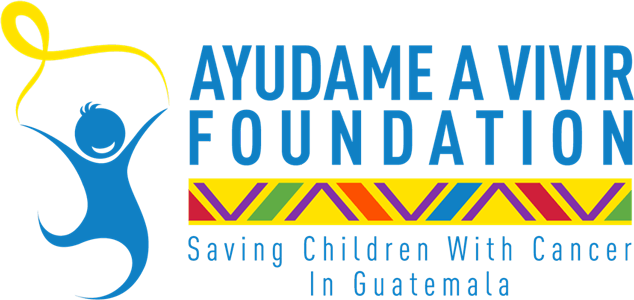Oncological Treatment
Currently, 150 patients are being cared daily through our Outpatient Clinic. Some of them go in for their treatments, others for their regular check-ups, and others for diagnosis and treatments.
Tratamiento Oncológico
Actualmente se atienden a diario alrededor de 150 pacientes en la Consulta Externa, algunos asisten para recibir su tratamiento, otros para su control regular y otros para recibir diagnóstico y poder ser atendidos.
- Although more than 700 Guatemalan children develop some type of cancer each year, only 50% of them receive care—thanks to AYUVI, the only institution that raises funds to provide holistic, free-of-charge treatment to patients facing pediatric cancer in Guatemala.
- Generally speaking, childhood cancer is usually not preventable. Nevertheless, it can be detected early if it's suspected by the family or the primary health care that is in contact with the child. In Guatemala, this breach impacts the late detection of the disease and/or the opportune detection of the cancer.
- Historical Data in Guatemala 1990-1995
- Didn´t have a specialized attention center
- 100 cases per year
- 42% was the abandonment rate
- Less than 20% survived the treatment after 2 years of diagnosis
Since its inception in 1997, Fundación Ayúdame a Vivir – AYUVI-, has been dedicated to raising funds to provide holistic treatment at no cost to children between 0 and 18 years of age who develop pediatric cancer in Guatemala.
- AYUVI´s first main achievement was the birth of the National Pediatric Oncology Unit in Guatemala. The Hospital has become a referral center for this disease, and it continues to be the only specialized center in pediatric cancer treatment, with a multidisciplinary and holistic approach in the Country.
In addition to providing a holistic treatment at no cost for 8 years (3 years of treatment and 5 years of follow-up), this project merges several elements allowing a multidisciplinary and professional team: psychologists, nutritionists, social workers, to mention a few. - Part of our holistic treatment is to provide attention, support, and palliative care for the patients who are terminal (30% of our patients). In other words, we complete the circle when all possibilities of life have been exhausted in our palliative care and center, AYUVI – Hogar Estuardo Mini, Hospice.
The patient and its family are allowed to remain in the hospice as long as necessary providing them with medical care, psychological and spiritual attention of the different crisis he will confront, which is typical for this disease.
The support given to the patient and the family members will decrease the levels of pain, fear, and distress.
- Currently, 150 patients are being cared daily through our Outpatient Clinic. Some of them go in for their treatments, others for their regular check-ups, and others for diagnosis and treatments. 90% of our patients come from areas with the greatest needs in Guatemala, their family's average income is around $250 a month.
The average cost to treat a child with acute lymphoblastic leukemia, the most common in pediatric cancer in Guatemala is $60,000.00
- Aunque más de 700 niños guatemaltecos desarrollan algún tipo de cáncer cada año, solo el 50% de ellos recibe atención, gracias a AYUVI, la única institución que recauda fondos para brindar un tratamiento integral y sin costo a los pacientes que enfrentan cáncer pediátrico en Guatemala.
- Por lo general, el cáncer infantil no se puede prevenir. Sin embargo, sí se puede detectar oportunamente cuando es sospechado por los familiares o la atención primaria de salud en contacto con el niño. En Guatemala esta brecha impacta en la detección tardía de la enfermedad y/o a la no detección del cáncer oportunamente.
- Datos Históricos en Guatemala 1990-1995
- No contaba con un Centro de atención especializado.
- 100 casos por año.
- 42% abandonaba el tratamiento
- Menos de 20% sobrevivían a los 2 años del diagnóstico.
Desde sus inicios en 1997, AYUVI se ha dedicado a recaudar fondos para poder brindar un tratamiento integral sin costo a los niños entre 0 y 18 años que desarrollan cáncer pediátrico en Guatemala, dándoles la oportunidad de luchar dignamente contra esta enfermedad.
- Su primer gran logro fue ver nacer a la Unidad Nacional de Oncología Pediátrica , hospital que se ha convertido en un centro de referencia en el tratamiento de esta enfermedad, pues continúa siendo el único centro especializado en el tratamiento del cáncer pediátrico, con un enfoque multidisciplinario e integral en el país.
Además de brindar un tratamiento integral sin costo, durante un periodo aproximado de 8 años; 3 de tratamiento y 5 años de seguimiento, este proyecto fusiona varios elementos de forma integral que permiten contar con equipo multidisciplinario de profesionales: psicólogos, nutricionistas, especialistas en trabajo social, por mencionar algunos. - Parte del tratamiento integral que se brinda, es el acompañamiento al 30% de los pacientes que luchan hasta el final de la vida, hasta trascender. Es decir, cierran el círculo cuando se agotan las posibilidades de vida, a través del hogar de atención y cuidados paliativos en Guatemala AYUVI - HOGAR ESTUARDO MINI, Hospicio.
En este lugar también se brinda apoyo psicológico y médico cuando se presentan diversas crisis propias de la enfermedad.
El acompañamiento a la familia y al paciente, disminuye los niveles del dolor, miedo y angustia.
- El 90% de los pacientes proviene de las áreas de mayor necesidad del país, sus ingresos por familia son de alrededor de US$250.00 mensuales.
El costo de tratamiento de una leucemia linfoblástica aguda, el cáncer pediátrico más frecuente en Guatemala, es de $ 60,000.00 por paciente.





